Passport please .. does it matter that ex US presidents don`t know new border rules for June 1?
May 30th, 2009 | By Dominic Berry | Category: Key Current Issues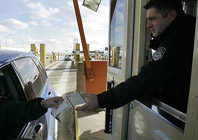 TORONTO. SATURDAY, MAY 30, 2009. [UPDATED MONDAY, JUNE 1]. According to Time magazine, there was a crowd of 5,000 inside the Metro Toronto Convention Centre yesterday, listening to former US presidents George W. Bush and William Jefferson Clinton share their experiences … as commander-in-chief. Meanwhile, only a few hundred protesters gathered outside …. Most of the anger was reserved for Bush, but the largest banner treated them equally: Bush & Clinton: War Criminals Not Welcome in Toronto.’ (We do believe in equality in Canada.) Time did not report on the part of the event that has most fascinated the Canadian Press: Bill Clinton and George W. Bush admitted … they had no idea the US was implementing a new rule Monday that would require Canadians and Americans to have passports to cross the border. Bloomberg.com, however, did tell us that: Both former presidents pleaded ignorance about the June 1 implementation of a passport requirement at the US-Canada border. And the deadline has certainly caught my attention. This coming Monday, June 1 I’m going to the Passport Canada office downtown, to plug into the Simplified Passport Renewal Process. My trip back to the auld sod in Tuscany was cancelled for this summer. But you never know when you might want to pop across the line to the USA, for any of many good and bad reasons.
TORONTO. SATURDAY, MAY 30, 2009. [UPDATED MONDAY, JUNE 1]. According to Time magazine, there was a crowd of 5,000 inside the Metro Toronto Convention Centre yesterday, listening to former US presidents George W. Bush and William Jefferson Clinton share their experiences … as commander-in-chief. Meanwhile, only a few hundred protesters gathered outside …. Most of the anger was reserved for Bush, but the largest banner treated them equally: Bush & Clinton: War Criminals Not Welcome in Toronto.’ (We do believe in equality in Canada.) Time did not report on the part of the event that has most fascinated the Canadian Press: Bill Clinton and George W. Bush admitted … they had no idea the US was implementing a new rule Monday that would require Canadians and Americans to have passports to cross the border. Bloomberg.com, however, did tell us that: Both former presidents pleaded ignorance about the June 1 implementation of a passport requirement at the US-Canada border. And the deadline has certainly caught my attention. This coming Monday, June 1 I’m going to the Passport Canada office downtown, to plug into the Simplified Passport Renewal Process. My trip back to the auld sod in Tuscany was cancelled for this summer. But you never know when you might want to pop across the line to the USA, for any of many good and bad reasons.
The vaguely appalling passport prospect …
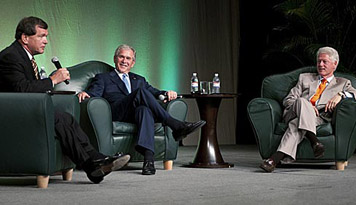 I have mixed emotions about the new Canada-US passport requirement myself. Former New Brunswick premier and Canadian ambassador to the United States, Frank McKenna, was the moderator at the Bush-Clinton event in Toronto ast night. And he raised the issue with some feeling: Mr. McKenna lamented that this [coming] week, for the first time ever, Canadians have to present passports at the border. We’ve never had a shot fired in anger in 200 years,’ he said. And we feel that’s being torn apart right now.’ The question was passionate enough for Mr. Bush to say: A hell of a speech. You should get back in the arena.’
I have mixed emotions about the new Canada-US passport requirement myself. Former New Brunswick premier and Canadian ambassador to the United States, Frank McKenna, was the moderator at the Bush-Clinton event in Toronto ast night. And he raised the issue with some feeling: Mr. McKenna lamented that this [coming] week, for the first time ever, Canadians have to present passports at the border. We’ve never had a shot fired in anger in 200 years,’ he said. And we feel that’s being torn apart right now.’ The question was passionate enough for Mr. Bush to say: A hell of a speech. You should get back in the arena.’
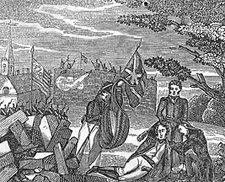 (Although some of us in Ontario might want to qualify the never had a shot fired in anger in 200 years somewhat. The Yankees to the south of us actually invaded the area where the Metro Toronto Convention Centre now stands – and all the rest of the old Town of York, UC – on 27 April 1813. More than a few shots were fired in anger on that occasion: a mere 196 years ago. At the same time, it is true enough that after the War of 18121814 there was no real fighting between forces commanded by the government of the United States and forces commanded by any government of one or another part of what is now called Canada, coast to coast to coast.)
(Although some of us in Ontario might want to qualify the never had a shot fired in anger in 200 years somewhat. The Yankees to the south of us actually invaded the area where the Metro Toronto Convention Centre now stands – and all the rest of the old Town of York, UC – on 27 April 1813. More than a few shots were fired in anger on that occasion: a mere 196 years ago. At the same time, it is true enough that after the War of 18121814 there was no real fighting between forces commanded by the government of the United States and forces commanded by any government of one or another part of what is now called Canada, coast to coast to coast.)
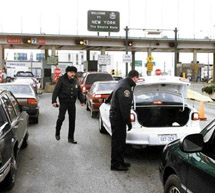 I am old enough to remember when, as a recent New York Times article put it, Americans and Canadians crossing the undefended border between the two countries were required to do little more than state their nationality. The New York Times says this was before the Sept. 11 terrorist attacks only some eight years ago. But my recollection is that the true palmy days of strictly oral border crossings with no documentation of any sort probably ended sometime in the 1960s. By the later 20th century you were well enough advised to have some kind of written identification on hand when you crossed the Canada-US border – a birth certificate, say, or a driver’s licence. It could save you a lot of trouble, if the crossing guards were taking their jobs too
I am old enough to remember when, as a recent New York Times article put it, Americans and Canadians crossing the undefended border between the two countries were required to do little more than state their nationality. The New York Times says this was before the Sept. 11 terrorist attacks only some eight years ago. But my recollection is that the true palmy days of strictly oral border crossings with no documentation of any sort probably ended sometime in the 1960s. By the later 20th century you were well enough advised to have some kind of written identification on hand when you crossed the Canada-US border – a birth certificate, say, or a driver’s licence. It could save you a lot of trouble, if the crossing guards were taking their jobs too 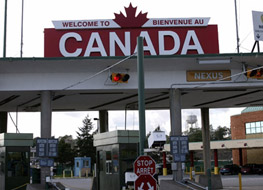 seriously. All the same, you didn’t need an actual passport. As of this coming Monday, June 1, 2009 you will (or some almost equally onerous document in some cases). And that certainly is quite unprecedented.
seriously. All the same, you didn’t need an actual passport. As of this coming Monday, June 1, 2009 you will (or some almost equally onerous document in some cases). And that certainly is quite unprecedented.
I can appreciate Frank McKenna’s emotion on the issue. In my lifetime, at any rate, Canadians have always been schizophrenic about the United States. On the one hand, we do want some kind of separate country, with is own flag, health care system, and diverse immigration policy (to say nothing of francophone Province of Quebec and seal-heart-eating Nunavut Territory). On the other hand, we are, as Goldie Hawn once said in I-forget-which movie, like attached to the neighbouring great republic. Many anglophone Canadians want to be as close to being Americans as possible, without actually being Americans. The idea that we will now need passports to cross into the United States – and vice versa – does seem vaguely appalling.
The thickening border and Canada’s economic future …
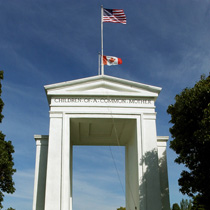 Then of course there are all the economic considerations that North Americans typically take far more seriously than we ought to, for our ultimate spiritual health. To start with, some parts of both Canada and the United States depend on a fairly large supply of visitors from the other place for their ongoing regional economic development. (We treat Canada like going to Ohio or to Chicago for the weekend, said Sarah Hubbard of the Detroit Regional Chamber of Commerce, in the New York Times article noted above: We have families living on both sides of the border. We have business partnerships on both sides of the border.)
Then of course there are all the economic considerations that North Americans typically take far more seriously than we ought to, for our ultimate spiritual health. To start with, some parts of both Canada and the United States depend on a fairly large supply of visitors from the other place for their ongoing regional economic development. (We treat Canada like going to Ohio or to Chicago for the weekend, said Sarah Hubbard of the Detroit Regional Chamber of Commerce, in the New York Times article noted above: We have families living on both sides of the border. We have business partnerships on both sides of the border.)
James Travers at the Toronto Star had an equally poignant column on it all today: This country’s financial future hangs somewhere between the optimism of Washington security czar Janet Napolitano’s Wednesday visit here and the pessimism of Monday’s new papers, please’ border controls. In the fight to keep trade flowing freely, painful Canadian sacrifices in blood, money and principles are proving poorly matched against US terrorism fears and rising protectionism … Two hard truths frame our current reality. Apart from national unity, not much is more vital to this country than timely access to the world’s richest market. And nothing Ottawa has done since 9/11, not even Afghanistan missions costly in lives and loonies, convinced Washington that America’s back door is latched and locked.
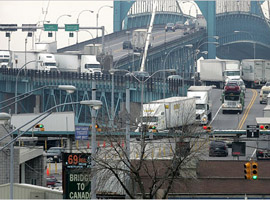 Mr. Travers went on: That failure, multiplied by recession and the reflex US Buy American’ response, has risky consequences. Along with squeezing arteries carrying more than a $1 million in goods and services every minute, they threaten the success of two economies moving beyond trade to making things together … Without open capillaries between corporations operating in both countries, job-creating industries vital to Canada, including an auto sector already staggering under continental restructuring, will strangle. After all, only a bonehead CEO would invest on the wrong side of a thickening border easily closed by a terrorist strike.
Mr. Travers went on: That failure, multiplied by recession and the reflex US Buy American’ response, has risky consequences. Along with squeezing arteries carrying more than a $1 million in goods and services every minute, they threaten the success of two economies moving beyond trade to making things together … Without open capillaries between corporations operating in both countries, job-creating industries vital to Canada, including an auto sector already staggering under continental restructuring, will strangle. After all, only a bonehead CEO would invest on the wrong side of a thickening border easily closed by a terrorist strike.
A recent article from the Inter Press Service news agency adds further detail: Canada has not recovered from the negative impact that the 9/11 attacks have had on north-south trade within North America, commented Steven Globerman, who teaches business at Western Washington university in Bellingham, Washington … While US exports to Canada returned to a normal level by 2004, Canadian exports have between 2001 and 2007 declined by about 15 to 20 percent because of a hardened 9/11 US border, Globerman told IPS … Another manifestation of this has been the Western Hemisphere Travel Initiative travel rules in the US … Many commentators have observed that because more Canadians carry passports than Americans, it is widely expected that US travel to Canada will decline…
The other side of the continental quarter … Good fences make good neighbours
 It would be foolish to deny Canadian reasons for concern in all this. At the same time again, from the other side of the modern Canadian schizophrenia about the American elephant next door, a thickening Canada-US border does have some conceivable advantages.
It would be foolish to deny Canadian reasons for concern in all this. At the same time again, from the other side of the modern Canadian schizophrenia about the American elephant next door, a thickening Canada-US border does have some conceivable advantages.
 Along with all its unmistakable virtues, the friendly embrace of the USA is also one of the most obvious greatest dangers for the future of any at all seriously independent Canadian sovereignty. If my recollections about how the Canada-US border began to thicken some time before 9/11 and all that are even remotely correct, the thickening border can also be viewed as, in some degree at least, an increasing US recognition of a thickening Canadian sovereignty. (And on our own side, we almost certainly do have to recognize that if we really do want to have a separate and independent country, it is going to have a border – and in principle at any rate the border between Canada and the United States cannot really be all that much different from the border between Mexico and the United States. A border is a border is a border, etc, etc, etc.)
Along with all its unmistakable virtues, the friendly embrace of the USA is also one of the most obvious greatest dangers for the future of any at all seriously independent Canadian sovereignty. If my recollections about how the Canada-US border began to thicken some time before 9/11 and all that are even remotely correct, the thickening border can also be viewed as, in some degree at least, an increasing US recognition of a thickening Canadian sovereignty. (And on our own side, we almost certainly do have to recognize that if we really do want to have a separate and independent country, it is going to have a border – and in principle at any rate the border between Canada and the United States cannot really be all that much different from the border between Mexico and the United States. A border is a border is a border, etc, etc, etc.)
 Similarly, the adjacent US market is enormously important to Canada economically right now, and will continue to be enormously important into any foreseeable future. Yet it is true as well that the world is changing, and there are in fact other growing markets for Canadian goods and services in a rising new global village – even allowing for all the current international economic stresses and strains. To quote from a recent piece by the counterweights editors on this very website: the percentage share of all Canadian goods exports destined for the United States has in fact been declining somewhat in the more recent past. According to the usual Statistics Canada data on the subject, some 82% of all Canadian goods exports went to the United States in 2003. By 2008 the share had dropped to 76%. (And by February 2009 it was down still further, to 73%.) Over the same period the shares of Canadian goods exports to all other major trading partners, except Japan, had inevitably increased. And the increase was especially prominent in the case of so-called Other Countries’ (which include China and India).
Similarly, the adjacent US market is enormously important to Canada economically right now, and will continue to be enormously important into any foreseeable future. Yet it is true as well that the world is changing, and there are in fact other growing markets for Canadian goods and services in a rising new global village – even allowing for all the current international economic stresses and strains. To quote from a recent piece by the counterweights editors on this very website: the percentage share of all Canadian goods exports destined for the United States has in fact been declining somewhat in the more recent past. According to the usual Statistics Canada data on the subject, some 82% of all Canadian goods exports went to the United States in 2003. By 2008 the share had dropped to 76%. (And by February 2009 it was down still further, to 73%.) Over the same period the shares of Canadian goods exports to all other major trading partners, except Japan, had inevitably increased. And the increase was especially prominent in the case of so-called Other Countries’ (which include China and India).
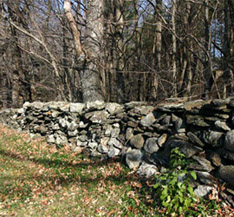 So when all is said and done, I will not be too vaguely appalled by what is going to happen on June 1, 2009. Personally, on that same day I will be going to get my passport updated, just in case I suddenly need to shuffle off to Buffalo – or Rochester or Albany or Boston or New York City (or Houston or Los Angeles or San Francisco or Seattle, or the Grand Canyon or the Mohawk Valley, etc, etc). But I should be getting my passport updated anyway. I hope I’ll be going back to Tuscany again next year, and then to many other parts of the world today too. Relations between Canada and the United States have changed since I was very young. In some ways we are closer than ever. But in other ways – and in spite of the fact that neither George W. Bush nor Bill Clinton apparently knew about their own new US-Canada border rules coming into effect this Monday June 1 – the United States is actually taking Canada slightly more seriously as a real country than it used to. We are all coming to recognize, in the hard-nosed New England realism of the haunting Robert Frost poem, that Good fences make good neighbours. And, as sad as it no doubt is in some respects, that finally may not be such a terribly bad thing.
So when all is said and done, I will not be too vaguely appalled by what is going to happen on June 1, 2009. Personally, on that same day I will be going to get my passport updated, just in case I suddenly need to shuffle off to Buffalo – or Rochester or Albany or Boston or New York City (or Houston or Los Angeles or San Francisco or Seattle, or the Grand Canyon or the Mohawk Valley, etc, etc). But I should be getting my passport updated anyway. I hope I’ll be going back to Tuscany again next year, and then to many other parts of the world today too. Relations between Canada and the United States have changed since I was very young. In some ways we are closer than ever. But in other ways – and in spite of the fact that neither George W. Bush nor Bill Clinton apparently knew about their own new US-Canada border rules coming into effect this Monday June 1 – the United States is actually taking Canada slightly more seriously as a real country than it used to. We are all coming to recognize, in the hard-nosed New England realism of the haunting Robert Frost poem, that Good fences make good neighbours. And, as sad as it no doubt is in some respects, that finally may not be such a terribly bad thing.
UPDATE JUNE 1: Travellers still allowed to cross without passport during summer travel season
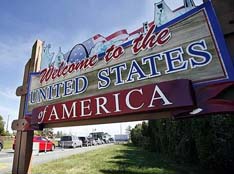 On the streetcar, on my way down to the Passport Canada office this morning, I noticed the following report in the Toronto Star:
On the streetcar, on my way down to the Passport Canada office this morning, I noticed the following report in the Toronto Star:
As cars and trucks breezed across the Peace Bridge to Buffalo this morning, it was shaping up to be a typical Monday at the US-Canadian border despite new documentation requirements coming into effect today.
Under the new requirements, Canadians will still be allowed across the US border without a passport or enhanced driver’s licence during this summer travel season.
They’ll just be scolded a little.
We’re going to be flexible, we’re going to go on a case-by-case basis,’ said Joanne Ferreira, spokesperson for US Customs and Border Protection.
Travellers that do not have the documents, they might face delays as our (border) officers will have to confirm their identity and citizenship,’ she said.
But we’re encouraging travellers to continue with their travel plans and to apply for their documents – if they don’t have them, to apply now.’
Hmmm … maybe Bill Clinton and George W. Bush finally managed to twist some arms at US Customs and Border Protection, after hearing the full story at last on Friday?
